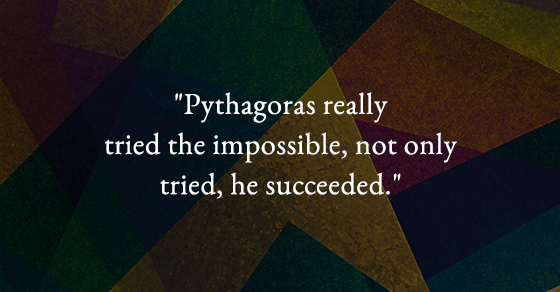
Pythagoras, as we know, was not just a mathematician – he had the power to explore the workings of the inner mind and the outer world. The wisdom of Pythagoras influenced Osho to embark on matters of politics, love and meditation, obedience and surrender.
Pythagoras, the spiritual and divine master stirs an effect in Osho’s ‘Philosophia Perennis’. Osho, in this volume, speaks of the little-known teachings of Pythagoras.
Here’s an excerpt from the book.
The truth of Pythagoras, the truth of the greatest synthesis ever attempted, can trigger a process in you, can start something so immense, about which you could have never have dreamed. That is the whole purpose of satsang: being in communion with a master. His presence, his utterances, his silences start working on you—sometimes even in spite of you. Sometimes you become aware of those processes, sometimes you are not aware of them; they start working underneath your consciousness. One day, they explode into a great blossoming.
Pythagoras really tried the impossible, not only tried, he succeeded. But the world wants to live in division, because the world can only understand conflict. It cannot understand synthesis. Synthesis can only be understood when some synthesis inside you starts happening; otherwise synthesis is non-understandable, will be misunderstood.
Everybody was against Pythagoras. All religions, all sects, all the so-called gurus of those days were against Pythagoras. In fact, they should have been there for him because he was bringing together all the scattered fragments of truth. But it hurts . . .
If I say that the Koran is true, as true as the Vedas, and people understand this, then both Mohammedans and Hindus would be tremendously happy. But that doesn’t happen; both become angry. The Mohammedan becomes angry because I have compared his holy book to an ordinary book, the Vedas; the Hindu becomes angry because I have compared his holy book to an ordinary book, the Koran. They both become angry because their egos are hurt.
You can understand what must have happened to Pythagoras because it is happening to me, it is happening to you, the same process. Hindus are against it, Mohammedans are against it; Jains, Buddhists, and Christians are against it. Why?
I am bringing Christ, Buddha, Mahavir, Zarathustra, Lao Tzu and Krishna to the highest possible synthesis, but still they are all against it. The reason is: they are divided within themselves. They can only understand that which they are. You can never understand anything beyond your consciousness. If you are split, you can only understand a split world. If you are in a subtle harmony inside, only then will any harmony happening outside be understood.
It is good that you felt great gratitude arising in you listening to the synthesis. It shows that something has started becoming integrated in you—something that is bringing you together, that is creating a kind of unity between the two hemispheres of your brain, the left and the right.
These two hemispheres of the brain have to be understood, and very deeply, because much depends on that. Now scientists are also in deep agreement with the ancient mystic lore that unless these two brains are bridged and bridged rightly a man remains schizophrenic. They are bridged, but in a very, very small way; just a small thread bridges them. That thread can be cut.










